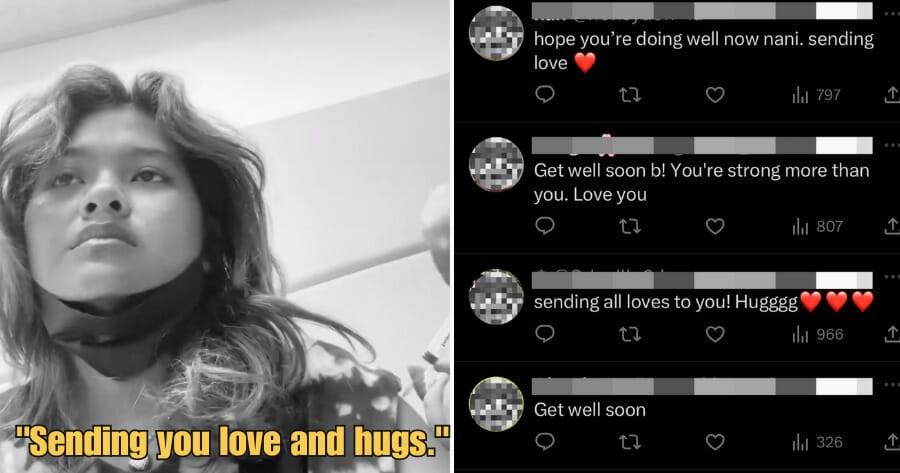**Trigger warning: The following article discusses sensitive topics related to mental health, self-harm, and suicide. Reader discretion is advised.**
On Twitter, @melaninsashimi (Nani) shared her experience in a psychiatric ward, shedding light on the challenges she faced and hoping to increase awareness about mental health struggles.
Nani’s journey began when she sought help for self-harm and overdose after 4 years of recovery and was admitted into the Emergency Room.

She stated in her Twitter post,

“The process upon registering to the ward took nearly 12 hours, depending on bed availability. The women’s ward was always full, but there were many empty beds in the men’s ward. Nurses and doctors would come from time to time to ask questions like, “What did you take when you overdosed?” and “What made you feel suicidal?”

“There were other questions that I can’t remember. They put on IV drips, gave me shots (to prevent tetanus), and I was finally assigned a bed at 5am. They took away my phone and gave me hospital attire to change into. The only belongings I could bring were toiletries, a towel, and slippers.”
Medical attention, including IV drips and tetanus shots, was provided. After a long wait, she was assigned a bed, and her phone was taken away, leaving her with only essential belongings.

“I had my own bed with curtains and a locker. The locker was for storing food, drinks, and extra clothes. Visitation was limited to two hours only, from 5pm to 7pm every day, and only one person was allowed to visit at a time.”
Nani had her own bed, curtained for privacy, and a locker for storage. Visitation hours were limited, and the daily routine included attending to needs in the morning, psychotherapy sessions, and optional occupational therapy activities.

“If I wanted to make a call to my parents or friends, there was only a public phone available, and I could only talk for 10 minutes. So, it’s important to bring coins with you. Visitation was strict, from 5pm to 7pm only. I couldn’t hold my phone or my visitors’ phones, and only one visitor was allowed at a time. Visitors couldn’t take me out, but they could bring food or books.”
Contact with the outside world was limited to a public phone, with a strict time limit of 10-minutes conversation.
Nani continues to explain,

“I spent 5 days and 5 nights in the psych ward. In the morning, nurses would wake me up around 7am. They would tidy the bed, provide me with fresh clothes, instruct me to take a shower (the toilets were not shared and had hot water), and ensure that I ate breakfast. At 8am, the nurse would call my name to take medication.”

She also stated that misbehaviour could affect circumstances.
“If you misbehave, for example, if you find ways to harm yourself (other than scissors and knives), your bed can be moved to the front for monitoring, and your stay will be longer.”
Severe cases might lead to isolation and restraint.

“During the night, it was not as restful because new patients would arrive, some patients would talk in their sleep, and some would scream and so on. In my case, I woke up every hour during my sleep, and I could request medication to help me continue sleeping if I wanted.”

“My advice to stay sane in the ward is maybe just to sleep. Because you won’t get the same amount of sleep when you’re out later. Make sure to bring a hoodie. The hoodie must have a zipper and strings (the nurses will remove the strings).”
Nani emphasised the importance of prioritising sleep.
Her story received overwhelming support from netizens



Nani’s candid sharing received immense support, emphasising the importance of empathy, understanding, and support for mental health.
You can take a look at the Twitter post below.
Trigger Warning
Went into relapse a week ago after 4 years of sobriety. Surrendered myself to the psych ward but at least I was in good hands and it is okay to start again. https://t.co/f6gH8XdzMS pic.twitter.com/CF9xR0apgi
— nani (@melaninsashimi) May 15, 2023
Open conversations, education, and compassionate actions are crucial to creating a safe environment for those navigating mental health journeys.
If you or someone you know is struggling with mental health issues or in crisis, please reach out to a helpline or seek professional help. Befrienders Malaysia: 603-76272929
Also read: Students in Sabah Uni Had to Look for Water Off-Campus During Long Standing Water Crisis






































